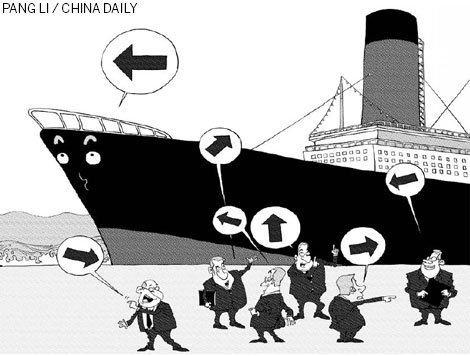Opinion
With political will, Cancun can succeed
By Connie Hedegaard (China Daily)
Updated: 2010-11-29 09:01
 |
Large Medium Small |

By 2050, there would well be more than 9 billion people on Earth. To accommodate this jump in population we have no choice but to complete the transition to a low-carbon global economy. That is what is at stake at international negotiations on climate change, and that is why the United Nations climate conference in Cancun, Mexico, is important.
An ambitious and legally binding framework for global climate action is needed. The European Union will be ready to agree to this at the Nov 29-Dec 10 Cancun conference. Regrettably, It seems a number of other major economies are not.
| ||||
These decisions should capture the progress achieved at the international climate negotiations so far and lay down some major elements of the "architecture" of the future global climate regime. They should build on the Kyoto Protocol and incorporate the political guidance of last December's Copenhagen Accord.
At recent preparatory meetings for Cancun, I have seen a hunger for agreement along these lines. With political will, the conference can translate this into a real step forward. Decisions are within reach on issues such as adaptation to climate change, the fight against deforestation, technology cooperation and governance rules for a new climate fund.
For the EU, a balanced package must include progress on mitigating global greenhouse gas emissions. In particular, the emission reduction pledges that developed and developing countries have made under the Copenhagen Accord need to be brought into the UN framework.
"Anchoring" the pledges in this way will provide a global forum to discuss uncertainties surrounding some of them and to consider ways to make them more ambitious over time. The current pledges are a start, but it is clear that they are not sufficient to keep global warming below 2 C, as the Copenhagen Accord recognizes is necessary.
We also need to see progress in Cancun toward reforming and expanding the international carbon market to capture the huge potential for emission savings in the major emerging economies. As Europe knows from its Emissions Trading System, carbon market mechanisms reduce the cost of cutting emissions, can drive investment in innovative low-carbon technologies and can be important sources of funding for future climate action
It is crucial that developed countries deliver on their pledges of "fast-start" funding to help the developing world fight climate change. The EU has mobilized 2.2 billion ($2.906 billion) in fast-start funding this year as part of our commitment to deliver 7.2 billion from 2010 to 2012. In , the EU will present a comprehensive report of how it has implemented its pledge this year.
Building trust also requires greater transparency - transparency in how countries deliver on their emission pledges, and transparency in how developed countries will provide long-term funding to help the developing world tackle climate change. That is why the EU is pressing for an agreement in Cancun to draw up stronger monitoring, reporting and verification rules.
A set of decisions in Cancun along these lines would constitute a significant intermediate step toward the robust and legally binding global agreement the world needs. An ambitious global framework will help accelerate the low-carbon revolution that is under way, spurring "greener" growth, creating more jobs and strengthening Europe's energy security.
Achieving a politically balanced package will not be easy, but it is within reach. Failure, on the other hand, would raise the risk of the international climate negotiations losing momentum and relevance. With political will, Cancun can succeed. Europe will be working throughout the two weeks of the conference to help see that it does.
The author is European Commissioner for Climate Action.
| 分享按鈕 |



